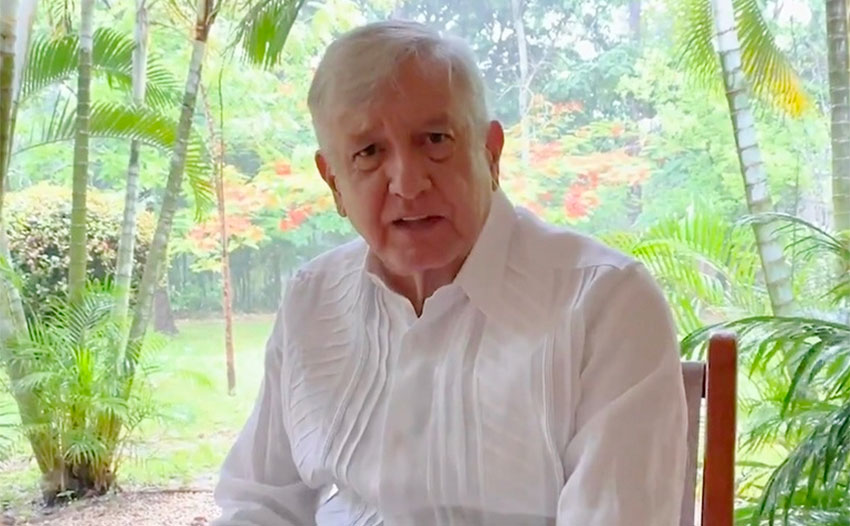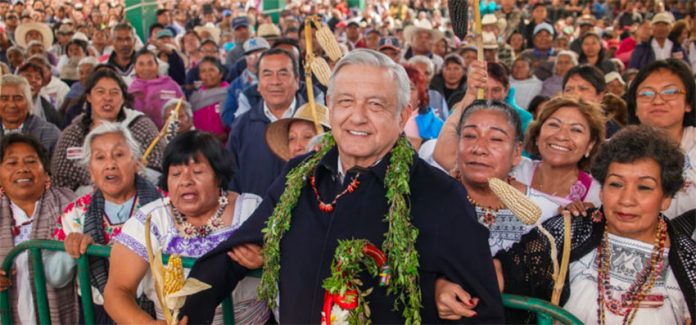Mexico is already recovering from the coronavirus-induced economic crisis, President López Obrador said on Saturday, pointing to the recent appreciation of the peso and the resurgence of oil prices.
In a video message recorded in Palenque, Chiapas, López Obrador said the crisis hasn’t destroyed the economy and “step by step we’re recovering” from the damage that it did cause.
He acknowledged that the peso dropped to a record low of more than 25 to the United States dollar in late March but highlighted that it was trading at 22.2 to the greenback on Friday. (The exchange rate was just above 22 to the dollar at 1:00 p.m. Monday).
He also highlighted that the price of Mexico’s export crude had recovered after dipping into negative territory in April as global demand for oil slumped due to the coronavirus pandemic. A barrel of Mexican oil was selling for almost US $30 at the close of trading on Friday, López Obrador said.
The president also noted that large companies such as Femsa (the world’s largest Coca-Cola bottler and the operator of the OXXO convenience store chain) and Walmart have begun paying back their multi-billion-peso tax debts.

“The [economic] model we’re applying is yielding results and is for the benefit of all people,” he said.
However, the road to economic recovery is unlikely to be as smooth and quick as López Obrador would like.
More than 750,000 people have already lost their formal sector jobs as a result of the pandemic and analysts and financial institutions are predicting a deep recession for the Mexican economy in 2020.
The economic crisis could push an additional 10.7 million people into poverty, according to the federal government’s social development agency, while two federal officials predicted last week that violence and crime will increase as a result of the downturn.
All but one of Mexico’s 32 states still face “red light” restrictions, according to the government’s stoplight system, meaning that nonessential economic activities are still prohibited and some key industries, such as tourism, could take years to recover fully.
While the nation as a whole has not yet returned to what is being called “the new normal,” the president has resumed one of his hallmark pre-pandemic activities: touring the country.
López Obrador traveled by road to Chiapas on Saturday and was to continue from there to the Yucatán Peninsula, where he will preside over a ceremony to mark the commencement of one of his pet infrastructure projects, the Maya Train.
No large campaign-style rallies of the kind the president held regularly before the pandemic – and even after Covid-19 was first detected in Mexico – are planned for the tour but opposition lawmakers and party leaders still criticized López Obrador’s decision to travel while the pandemic continues to rage.
The leader of the National Action Party (PAN) in the lower house of Congress said that people will ask themselves, “If he’s already going on a tour, why can’t my children and I go out to do our activities?”
The president has a responsibility to send an “exemplary message” to the Mexican people that will help to avoid new coronavirus infections, Juan Carlos Romero Hicks added.
He said that López Obrador’s decision to resume his national tours is one of a range of errors he and his government have made in response to the coronavirus pandemic.
Among them: downplaying the dangers of the outbreak, not testing widely for the disease, launching a plan to reactivate the economy at the peak of the pandemic and not reporting the real number of cases and deaths.
PAN national president Marko Cortés said in a statement that the resumption of presidential tours could cause new outbreaks of Covid-19, while Democratic Revolution Party lower house leader Verónica Juárez Piña said that traveling the country while most of the country is at the “red light” risk level is “a grave act of irresponsibility.”
By going on tour, López Obrador encourages other people to break quarantine and thus “creates the conditions for infections and deaths to increase,” she said.
“From the beginning to the end, the president hasn’t [accurately] measured the magnitude of the pandemic and has always prioritized his political interests over the interests of citizens,” Juárez said.
Institutional Revolutionary Party national president Alejandro Moreno Cárdenas offered a scathing assessment of the federal government’s response to the pandemic, including the decision to end the national social distancing initiative while the risk of infection remains high.
“We have to raise our voices loudly because … when … almost the entire country is in a maximum risk area, they’re abandoning the healthy distance initiative without any plan to take care of lives and save hundreds of thousands of jobs that have been lost. We’re worried that infections, death and unemployment will continue [to increase] due to a lack of clear decisions,” he said.
Moreno also charged that the government has committed a series of errors in forecasting the impact of the pandemic.
“They were wrong about when the peak of infections would be; they were wrong about the number of deaths we would have; they were wrong about the fatality rate the virus would have in our country; they were wrong about the number of jobs that would be lost. … The federal government can’t blame anyone but itself for its inefficacy and inefficiency. There’s no excuse, … it wasn’t corruption, the conservatives or a conspiracy – it was them and their bad decisions.”
Source: Milenio (sp), El Universal (sp)
